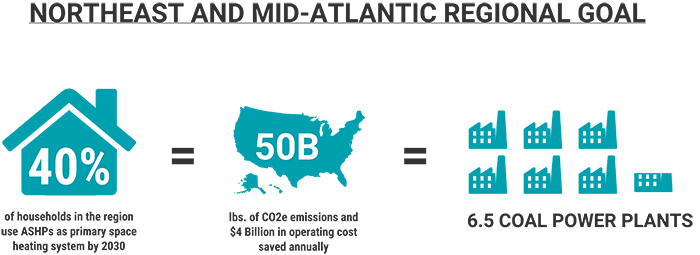By David Lis | Thu, May 25, 17
On June 27-28, NEEP will be convene its fourth annual Air Source Heat Pump (ASHP) workshop at Schneider Electric’s campus in Andover Massachusetts. Key ASHP stakeholders from around the region will come together to discuss various market strategies aimed at transforming the region's residential space heating and cooling market from one dominated by gas and oil heating systems to one with deep penetration of ASHPs. Manufacturers, distributors, installers, technology experts, program administrators, state policy makers, and community organizers are just some of the stakeholders that make up the collective ASHP “village”. Not surprisingly, different market actors bring different expertise and capacities to the table. It’s long been NEEP’s view that in order to effectively transform markets, “it takes a village” to work together, and our annual workshop is designed to organize and mobilize our diverse community of stakeholders. This is a unique value-add NEEP, as a regional energy efficiency organization, can bring to this and other markets.
ASHP is a technology that offers the region a number of exciting benefits including energy cost savings, GHG emission reductions and grid flexibility. NEEP launched a regional ASHP initiative in 2013 to chart a path for how the region could work together to effectively accelerate the adoption of ASHPs. Coming out of that initial process was a market transformation strategy report that detailed key market barriers and opportunities for ASHPs and what kinds of strategies were necessary to overcome or leverage them. We recently updated the Northeast/Mid-Atlantic Air-Source Heat Pump Market Strategies Report to reflect current market realities. The strategy report has served a roadmap of sorts to provide structure to the initiatives’ objectives and activities.

The report led NEEP to work with our village of regional stakeholders to develop a cold climate ASHP specification in response to the deficiencies of existing performance metrics. Similarly, the report led NEEP to again work through our regional village to develop guidance materials for ASHP installers on sizing, selecting and installing systems.
Our annual workshop is an integral part of the regional initiative. This “village” gathering offers us a key opportunity to dive deeply into what strategies are working, what strategies are missing, and how we can more effectively work collaboratively across market actors. This year’s workshop includes an opening speaker, a series of sessions that will explore each of the seven key strategies laid out in the market transformation strategy report, as well as a “speed dating” session where manufacturer representatives can discuss manufacturer-specific strategies more openly with regional stakeholders.
Jamie Howland from the Acadia Center will offer opening remarks related to Acadia Center’s recently published EnergyVision 2030 which states “clean energy technologies offer an historic opportunity to build an energy future that produces large consumer, economic, and climate benefits. EnergyVision 2030 shows how, by redoubling existing efforts in four key areas, New York and the six New England states can accelerate this transition and achieve a modern, low-emissions energy future.” Jamie will describe the role ASHPs might play in this future.
The bulk of the workshop will be made up of specific sessions focused on the key market strategy areas identified in the 2016 market transformation strategy report:
1. Increase consumer education and awareness – Jonathan Comstock will share his experiences implementing Heat Smart Tompkins, a community-based initiative aimed at educating and enabling citizens of Tompkins County to learn about and install clean heating technologies.
2. Increase installer/builder awareness of, and confidence in, ASHP through expanded training and education – Bruce Harley will give a short presentation on NEEP’s recently published Installer Guides aimed at providing guidance to installers when it comes to sizing, selecting and installing ASHPs in cold climates.
3. Reduce upfront costs of installed systems through robust and aligned promotional programs and the support of alternative business models – This session will include a presentation from VEIC’s Howard Merson on some novel mid-stream program models for ASHPs.
4. Mobilize state and local policymakers to expand support for ASHPs – Speakers are being invited to highlight state and local policy activity aimed at promoting ASHPs.
5. Promote advanced control technologies to allow automated coordination among multiple heating systems – Dana Fischer from Efficiency Maine will provide an update on a pilot he is leading that is looking at integrated control systems that manage ductless ASHPs in coordination with central heating systems. Richard Faesy from Energy Futures Group will share additional perspectives on the need for, and potential of, these types of controls.
6. Enable the promotion of climate-appropriate ASHPs through improved performance metrics – NEEP will lead this session to inform the evolution of its cold climate ASHP specification. Is this technical definition of cold climate ASHPs still appropriate? Should the technical requirements reporting requirements evolve? How might the CSA’s new proposal for ASHP test procedure impact the specification?
7. Develop more accurate tools to predict energy, cost and GHG savings associated with ASHP installation through collection and analysis of real world performance data – Dave Korn from Cadmus will present on the findings from its recent Ductless Mini-split heat pump Impact Evaluation that the group conducted for the Massachusetts and Rhode Island program administrators. The evaluation study offers the most comprehensive in-field monitoring study of its kind to date and is filled with important data for the ASHP community to unpack.
If you want to be a part of this regional effort to transform the residential HVAC market towards ASHPs, REGISTER for the workshop today. Space is limited. Remember, it takes a village to transform markets, and that means we all have a role to play.
See many of you there.
